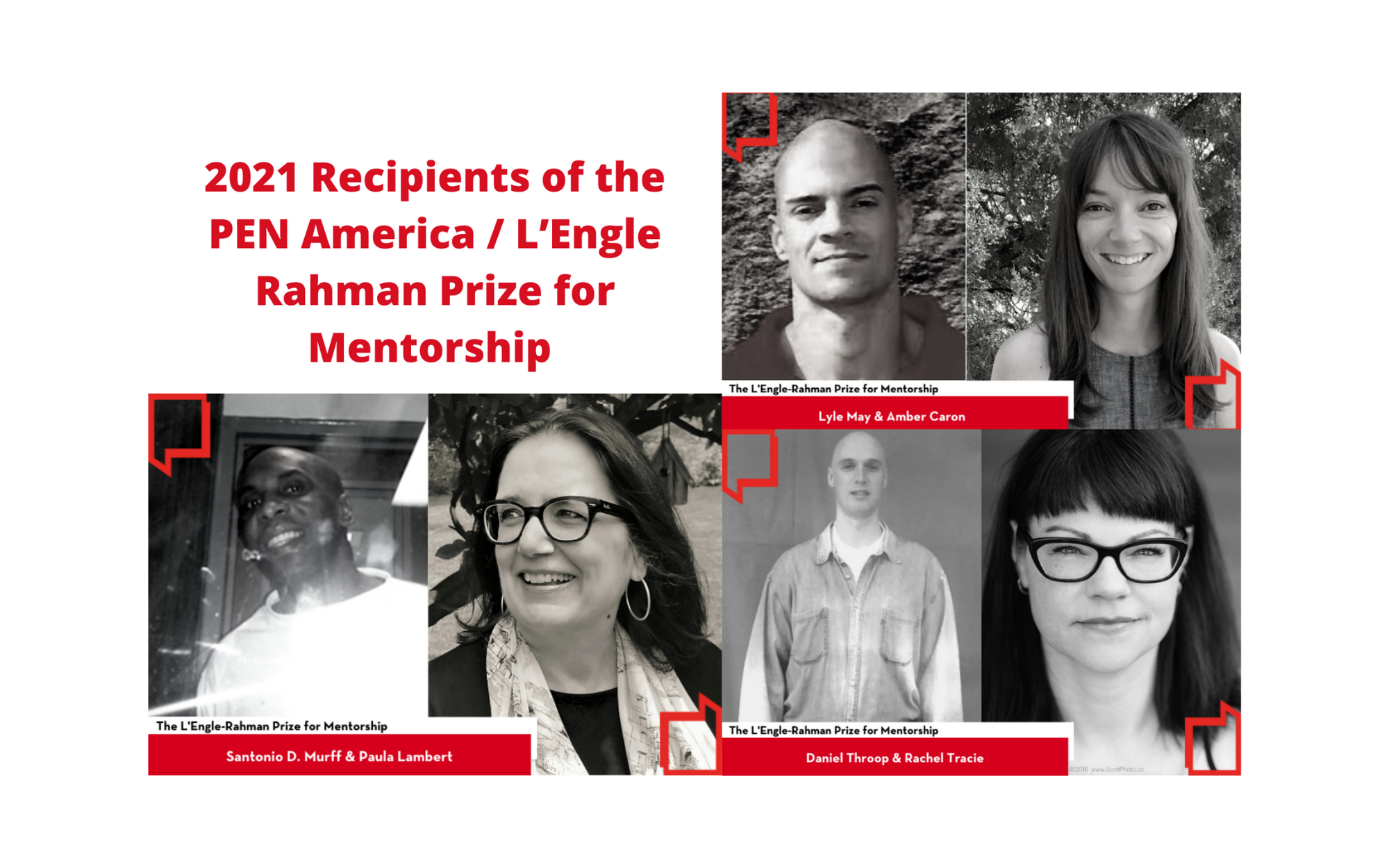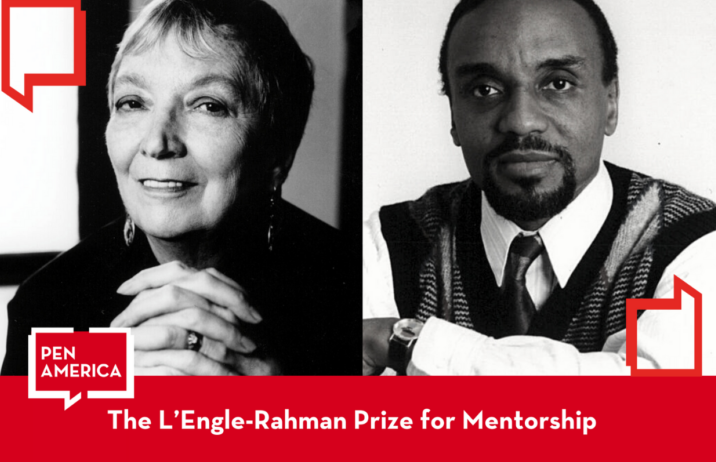From the beginning of the PEN America Prison Writing Mentorship Program, it has been clear that the most effective relationships between mentors and incarcerated writers are marked by growth and development on both sides. The best mentors, it seems, often get just as much as they give, if not more, from those they mentor. The exchanges between mentors and mentees are marked by a sense of openness, curiosity, and, most importantly, respect.
On the eve of the announcement of the 2021 PEN / L’Engle Rahman Prize for Mentorship, Teachers & Writers checked in with this year’s award recipients to learn more about their involvement with the prison mentorship program and their thoughts on what it means to be a mentor.
Teachers & Writers: In your experience, what is the most important thing a writing mentor can provide to a fellow writer? Does working with writers who are incarcerated present any challenges to the mentor-mentee relationship?
Amber Caron: I think the most important thing a writing mentor can offer a mentee is the respect to engage them first and foremost as a fellow writer. It’s critical for mentors to take the writing seriously, engage with it on its own terms, always with an eye toward understanding what the writer is trying to do and how they might do it better.
“The most important thing a writing mentor can offer a mentee is the respect to engage them first and foremost as a fellow writer.”
Amber Caron
As for the challenges, I want to be careful here because I worry the challenges might discourage others from participating in this kind of mentorship. I want to make clear that any challenges I’ve faced pale in comparison to those faced by Lyle as he writes and seeks to publish his work. But, yes, there are challenges: letters I send to Lyle don’t always reach him. Letters he sends to me don’t always reach me. This was especially true during the pandemic, and at one point, he had to send letters to a friend who then scanned and emailed them to me. Eventually, the mail system seemed to work out the kinks only to have Lyle’s facility change mail procedures again, with mail being managed through a company in Maryland, even though Lyle is in North Carolina. It all seems unnecessarily complicated—and perhaps intentionally so—but what might be a minor annoyance for me is much more significant frustration for Lyle.
Paula J. Lambert: I think the most important thing a mentor can provide is confidence. Moving forward in creative work nearly always takes courage, a sense that what we’re doing is worthwhile, that it will connect to an audience. And we put so much of ourselves “out there” in our work, that it can be daunting to wait for a response, to know how it will be received. That leads to one challenge in working with incarcerated writers: the mail system can take a long time. It can increase a sense of anxiety on the part of the writer waiting to hear feedback, and sometimes in the mentor hoping their responses were helpful or well received. But whatever on the one hand might be occasionally frustrating, on the other hand increases our anticipation, which can be really exciting. Both sides are always looking forward to what’s to come.
Rachel Tracie: I would say encouragement and real feedback that hopefully allows for pushback and conversation. As well, resources for writing! The biggest challenge is timing and communication. Everything is mediated – sometimes through multiple people and this can cause significant delays and missed communications which can certainly be frustrating.
T&W: What drew you to become a mentor in the PEN program?
Amber Caron: I encouraged Lyle to seek a mentor through the PEN prison writing program because I think it provides an invaluable community for incarcerated writers. When I encouraged Lyle to seek out a mentor, I thought he would try to link up with a journalist or non-fiction writer. But he asked if we could continue working together. So, really, I have Lyle to thank for looping me in and giving me the opportunity to contribute in some minor way to his work.
Paula J. Lambert: Certainly the opportunity to be connected to an organization as important and as prestigious as PEN America was a factor. I’m often trying to think how my work might do the most good—how to be a good literary citizen, a positive part of a larger community. And sometimes you want to do that quietly. The prison mentorship program seemed to me an especially important part of what PEN America does and was what I most wanted to be part of.
“Having known people quite closely in all parts of the system, no part of it has ever seemed abstract. I grew up knowing how important it is to keep a true sense of humanity connected to any conversation about our incarcerated populations.”
Paula J. Lambert
Growing up, there was a corrections facility in my hometown, and we had friends who worked in the pre-release center—important, helpful, healing work. The facility later changed from minimum to medium security and became a larger employer for the town, as well as a more imposing presence. We also had a family member in another state who was incarcerated. So having known people quite closely in all parts of the system, no part of it has ever seemed abstract. I grew up knowing how important it is to keep a true sense of humanity connected to any conversation about our incarcerated populations.
Rachel Tracie: During Covid, a lot came to a halt, and I wanted to participate in some kind of meaningful engagement. I teach fairly regularly in prisons and wanted to be involved in a program where there could be more intensive communication around writing, which the PEN mentorship really allows.
T&W: Did the experience of mentoring in the PEN program change—in any way—how you think about the possibilities of writing?
Amber Caron: More than anything else, it reminded me what writing with urgency looks like.
Paula J. Lambert: I think, if anything, it reinforced my own experience of what writing is. It helps all of us to process what goes on in the world, to process our own lives and experiences, our connections to other people. For quite some time I was involved in teaching writing as a healing process—that is, for me, the most fundamental part of what writing is, whether we want to help ourselves or figure out how we might nurture a difficult, ailing world. Helping another human being through any part of this process is both humbling and very, very rewarding. That was certainly my experience in this program with my mentee.
Rachel Tracie: Yes. As primarily a theatre person, I felt somewhat wobbly when Daniel mentioned that he was working on a non-theatre piece – ultimately a memoir. I have learned so much about how really, it’s a conversation rather than an “I have all the answers”. Because goodness knows, I don’t! So, Daniel probably without knowing it has really encouraged me to step into different types of writing, and to feel more confident about the way that the act of writing is as much about perseverance, openness and curiosity as it is about a particular genre or style.
T&W: At Teachers & Writers we believe that teaching creative writing is “educating the imagination.” It is our belief that learning to tell our stories helps us see the world with more depth and clarity and heart. Are there ways—large or small—in which this mentorship changed your vision of the world?
“He is telling a story no one else can tell, and he is doing it under circumstances most of us can’t even begin to fathom, including the very real threat of retaliation by the criminal justice system. It takes courage to do this, and it requires a belief in the power of language to shift people’s thinking by holding up a mirror to society.”
Amber Caron
Amber Caron: In hindsight, I can’t imagine not being changed by this experience. The more I read of Lyle’s work, the more obvious it becomes that he is telling a story no one else can tell, and he is doing it under circumstances most of us can’t even begin to fathom, including the very real threat of retaliation by the criminal justice system. It takes courage to do this, and it requires a belief in the power of language to shift people’s thinking by holding up a mirror to society. Through his essays, articles, and lectures Lyle exposes a carceral state that is more focused on punishment than rehabilitation. So, that’s the depth and clarity. But there’s also a tremendous amount of heart in Lyle’s work. Whether his attention is focused on religion or education or criminal justice, Lyle’s reporting enables us to see the humanity in the friends and mentors around him and to hope for a better future against the odds.
Paula J. Lambert: My last book publication was a collection of poems called How to See the World, so I love how this question is worded! I believe absolutely that this is what telling our stories does, that it “helps us see the world with more depth and clarity and heart.” That was certainly the underlying theme of my collection!
I’m not sure the mentorship changed my vision of the world so much as it reinforced it. We are here to love and serve one another. In that process, what we receive more than equals what we offer. Our sense of the world itself, our humanity and our connection to the planet we live on, continually expands, and in the most amazing ways.
“Sometimes things seem so insurmountable, whether because of geography or say, a global pandemic, or any other number of reasons. This mentorship has shown me, through communicating with Daniel and reading his writing, one more story.”
Rachel Tracie
Rachel Tracie: Yes. Sometimes things seem so insurmountable, whether because of geography or say, a global pandemic, or any other number of reasons. This mentorship has shown me, through communicating with Daniel and reading his writing, one more story. And his story has truly helped me see the world with more “depth, clarity and heart.” His words and perspectives have broadened my perspectives on perseverance, writing and hope. And I have been encouraged to persevere. To keep writing and to keep hoping.
Susan Karwoska is a writer, editor, and teacher. She is the recipient of a New York Foundation for the Arts (NYFA) Fellowship in Fiction; a Lower Manhattan Cultural Council Workspace residency for emerging artists; and residencies at the Ucross Foundation and at Cummington Community of the Arts. From 2005-2014 she was the editor of Teachers & Writers Magazine and currently serves on its editorial board. She is also on the board of the New York Writers Coalition, and has served on NYFA’s artist advisory board. She writes and edits for a variety of publications and organizations, works as a writer-in-the-schools, and lives in Brooklyn, New York, where she is at work on a novel.



